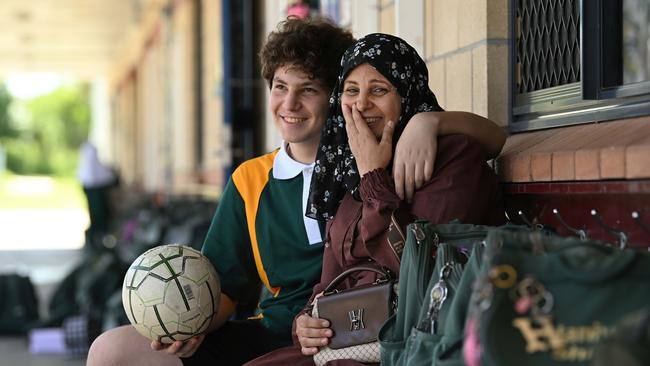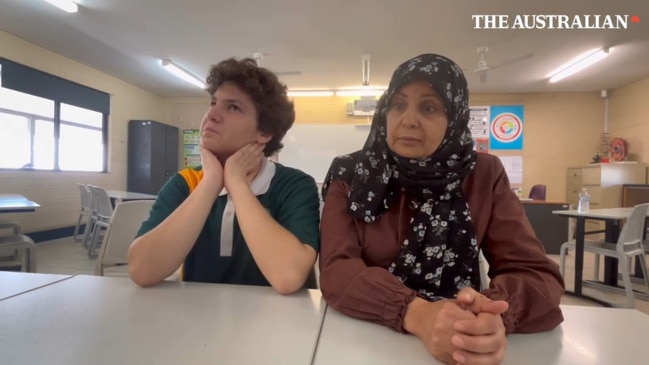Mum and soccer-fan son escape Gaza carnage and find asylum in Brisbane
Return to school at last for a Palestinian refugee teenager.

The last time Nidal Haseera saw his school in Gaza, it had been reduced to rubble by an Israeli airstrike.
A world away from the war zone, the traumatised teenager started at a new school in Brisbane this week, thanks to his mother’s courage and the kindness of a stranger in a supermarket.
The Palestinian mother and son are grateful to be settling in Australia as refugees, ending a seven-year odyssey that left them trapped in the crossfire between Hamas terrorists and the Israeli military at the end of last year.
“I hope for my son to live safely and make himself a good man, and work a good job, to help Australia,’’ Ms Haseera said. “I want to make a chance for my son.
“We thank Australia for accepting us and assisting us to come (here). We were worried for so long that we might not ever make it out of Gaza alive.’’
As the new kid in class at the Islamic College of Brisbane this week, Nidal was putting on a brave face. The year 9 student hopes to study engineering, but grins that the best thing about school is playing soccer: “I want to be a footballer!”
He grew up in the Al-Nuseirat refugee camp in the Gaza Strip, his childhood scarred by chaos, carnage and grinding poverty.
The bomb that demolished his school struck on a weekend, sparing students as Israel retaliated against the Hamas attack last October that left about 1200 dead and about 240 kidnapped.
Even so, the interminable Hamas-Israeli war has killed one of Nidal’s closest friends, and left another paralysed and brain-damaged.
Nidal was seven when his mother applied for asylum through the UN refugee resettlement program.
Her husband had left Gaza for Syria, and her two older sons fled to Jordan and the United Arab Emirates, abandoning Ms Haseera to raise Nidal on her own.
Australia granted the pair a humanitarian visa in 2022, but before they could resettle in Australia, they became trapped in a war zone.

As Israeli rained bombs upon Gaza, mother and son risked a perilous 25km journey to the Egyptian border crossing at Rafah four times, only to be turned away each time.
After pleading with Australian embassy officials to “sort out the paperwork’’, they were allowed to cross into Egypt in November last year on their fifth attempt.
Australian embassy staff provided emergency relief until they were flown to Brisbane,
Multicultural Australia helped them settle in Woodridge, in Brisbane’s south, where a chance encounter in a supermarket last Friday resulted in a scholarship for Nidal at the Brisbane Islamic College of Brisbane this week.
Ms Haseera noticed a fellow shopper wearing the traditional Islamic hijab. “I was so happy to see Arabic people here, because I am alone here,’’ she recalled.
“I talked to her and she told me the Islamic school is good, and she drove me here.’’
The head of the college secondary school, Sami Muamar – who grew up in Gaza – said the college and private sponsors were helping the Haseeras “socially, emotionally and financially’’.
“They need opportunities to heal and grow,’’ he said. “They have left family members behind, while others have been killed.
“We are putting programs in place around them to help navigate cultural differences, overcome language barriers and integrate into the community.’’
The school’s chief executive, Ali Kadri, said a specialist teacher would provide intensive English lessons, which had helped other migrant students master their new language within six months.
Nidal’s greatest wish is for his best friend, Kenan Alluh, to join him in Brisbane. “I just want one friend to come here,’’ he said. “I miss him so much.’’
Ms Haseera, 50, has trouble sleeping as she worries constantly about her extended family – especially her beloved six-year-old niece. “I am sad because I am thinking about my family now under the bombs,’’ she said.
“How many people die in Gaza – 25,000 have died – children and women. Why? Why?
“We want to be happy and live in safety and for our children to play, as every other child in the world.’’
Ms Haseera is thankful for her new life here but wants Australians to understand that innocent civilians are caught between Hamas terrorism and Israeli retaliation. With tears in her eyes, she said Israelis had bombed Palestinians lining up to fill containers of drinking water.
“We thank Australia for accepting us and assisting us to be in Australia,’’ she said.
“We ask them to stand beside us for a ceasefire as more children are dying by the day. I want people to put their feet in our shoes.
“Our life was very dangerous and horrible, horrible and scary without water, without food.
“There was death in every corner. We lived in fear. But it seems that people don’t believe us.’’
A Department of Foreign Affairs and Trade spokesman said the federal government had supported 196 Australian citizens, permanent residents and their family members to flee Gaza since the start of the war.
“Exiting Gaza is difficult and unpredictable,’’ he said.
“The ability of the Australian government to help is extremely limited.’’



